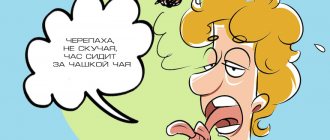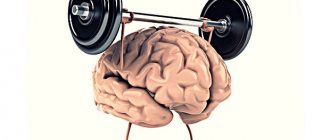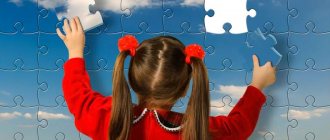Hello everyone, dear readers! Lyudmila Redkina is in touch. How often have you had to float your brain during a lecture or while talking to someone? No, not when you don’t understand the topic of conversation at all. Namely when you make every effort to concentrate? Have you ever experienced a situation where you read the same news on Instagram or Facebook and catch yourself thinking about something completely different? Perhaps you didn’t notice the “Give Way” sign or by chance you survived crossing the road when it was red? Today we’ll talk about how to develop attention and what you need to do to achieve this.
What is attention and what properties does it have?
In psychology, attention is understood as the ability to select and concentrate on stimuli that attract us for some reason. We select information consciously or unconsciously, process it, while at the same time ignoring other information.
Such selection, ignoring unnecessary things and processing is one cognitive process - attention. It helps us not to become overwhelmed by the amount of information we absorb, not to become frostbitten from what is important, and, accordingly, to react to our processing.
And I’ll immediately give an example to make it clear. You're getting ready for work and listening to the radio in the background. In addition to the songs, weather reports slipped through. And you focused your attention on them: it will rain today, which means you need to take an umbrella. The cognitive process helped you by ignoring it not to clog your brain with songs, select useful information about the rain and react accordingly - take an umbrella to work.
Our mental process of selecting information is divided into types:
- Involuntary - when we unconsciously pay attention to flowers, advertising, pictures, people, etc.
- Voluntary - we consciously direct attention to the selection of information, for example, while studying or during an important conversation.
- Post-voluntary – when a person first forced himself to pay attention, and then he became interested and no longer needed to specifically hold it.
This process also has the following properties:
- distribution,
- switchability,
- sustainability,
- concentration,
- volume,
- speed,
- intensity.
Read more about this classification in the article Types of attention in humans.
What is mindfulness?
Mindfulness is the ability to concentrate on performing a specific activity, to focus on a specific object or phenomenon. Accordingly, mindfulness training consists of developing a person’s ability to focus his attention, and not scatter it around.
Most often, external stimuli or distracted thoughts prevent us from concentrating. For example, it is difficult for a student to concentrate on completing a written assignment when his desk neighbor interferes with the lesson and pesters him. Even if this student is alone in his room, but all his thoughts are devoted to playing football with friends, he will also not be able to be attentive.
It turns out that when trying to figure out how to develop mindfulness, we first need to understand how we can learn to focus and drive away all extraneous thoughts.
Take a character test
Why develop attention
The process of information selection is very closely related to other cognitive processes. For example, it cannot exist without memory. More precisely, memory without it. If there is no selection of information, there will be no specific memorization - about everything and nothing. That is why many students who have problems with academic performance need to develop their attention, not their memory through poetry.
Not only memory depends on concentration, but also thinking, perception, and speech. This is understandable - we plunged into the depths of the brain. But in practice, why do we need to develop it?
- Increase work efficiency - if you are distracted by everything and everyone, then you are unlikely to do your serious work, and this is already a disadvantage for you as an employee.
- Moving up the career ladder follows from the first point. When distraction goes away, then your career will go up + for leading positions you must learn to quickly switch attention from one thing to another.
- Attentive driving - any driver, by the will of fate, must keep his attention on the road, his life and that of other people depends on it.
- Doing several things at the same time is generally an extremely necessary skill of the 21st century; you will have a very hard time if you do not learn how to do it.
Inattention dooms you to failure: redoing work, reducing the respect of others for you, danger on the road and a huge number of all sorts of problems.
Soooo, what should we do about it now? We learned what attention is and figured out why we desperately need it. And how to get it - so important and necessary?
When our attention is disrupted
If you periodically have problems with attention, don’t worry, this is common to all normal people. We want to embrace everything that happens in us and around us, and it is quite natural that this does not always work out. In addition, factors such as insomnia, fatigue, and prolonged overexertion can interfere with the concentration of our thoughts. But they do not last long, they take a short time. If they last longer, then a certain type of disorder is present:
- Absent-mindedness. With weak concentration, an involuntary, easy switching of human attention occurs. This is more common among preschoolers and elementary school students. There is everything in their head, but not the main thing.
- Absent-mindedness of scientists. Pundits, as a rule, concentrate their attention on something specific, their teaching, science. They are not able to quickly switch to other things.
- Absent-mindedness is age-related. Old people suffer from this disease; they forget everything and are unable to concentrate on specific positions. The cause is age-related diseases, problems with memory, and brain activity.
- The attention span is reduced due to other significant factors and events. People in moments of grief or great happiness can be absent-minded and inattentive.
- Attention fatigue – occurs due to depletion of concentration when working on a specific task for a long time.
If brain diseases are present, a person may develop serious problems with concentration and other, more complex diseases.
Tips for developing mindfulness
I warn you right away that in response to some advice you will say: “By, we already knew that!” So if you knew, why don’t you do it all the time?! Attention needs to be protected and developed; this is a very capricious process of our brain. The situation will change a little abruptly - we have already lost him.
Concentration
A lot of research has been done on the topic of concentration, there are special tests for attention and determining the level of concentration. And the authors agree that the following tips will definitely improve this property:
- Walk in nature - walking restores nervous processes. In nature there are fewer irritants that distract a person. While walking, you can think about something important and restore your mental and physical strength.
- Immerse yourself in your favorite activity - it helps develop concentration. Choose a time when no one will disturb you. Sometimes it’s difficult, but even if you devote 30 minutes to what you love, it will already have its result.
- Read interesting books - reading, in general, has become a curiosity for the “gadget” generation. So now every second person suffers from concentration. Read, my dears, so that you don’t feel ashamed of your lost concentration.
Sustainability
This property helps us keep our attention in suspense until the end of the task. Remember when we were writing a dictation at school, we literally crawled out of the office because we were incredibly tired. Why? Because they kept our resilience and concentration under strain. And this, I tell you, is a huge effort of the brain, especially for a child.
Resilience can be developed in the following ways:
- Reading – it will be mentioned often today. The problem is that reading is one of the main factors in the development of attention. Sustainability is achieved through long reading.
- Observation - in the park or in the yard, select an object and watch it for 15-20 minutes, just follow it with your eyes, examine it.
Switchability
The speed of transition from one activity to another is the key to a manager’s success, we have already talked about this. Have you seen an absent-minded person? So this is the absence or low switchability of attention. How to develop it:
- In the house, try to do as many different things as possible in an hour. It's not even a matter of execution speed. It is important that these tasks be different in nature: wash the dishes, read 1 news, cook scrambled eggs, do a warm-up, talk on the phone for 5 minutes, watch TV at the same time, and then tell yourself what they were talking about and what they were watching.
- On the street, look at what a passerby is wearing, what brand of car was driving, how many cracks are on the asphalt ahead, etc.
Distribution
A person's ability to hold several different objects in attention. This is very clearly visible from drivers: hold the brake pedal, depress the clutch, turn the steering wheel, watch the situation on the road and talk about nuclear physics, for example.
- Take a piece of paper, two pens and write your first and last name with both hands at the same time.
- Say the numbers 1 to 20 out loud while writing them in reverse order on the sheet.
- Draw different geometric shapes in the air with both hands at the same time.
Volume
This is the ability of a person to focus on several objects simultaneously in a split second. On average, for adults it is 4–6 objects. But in children it is 1-2. So they need to increase the volume. To do this, the distribution is first trained. Then the child is given tasks like:
- look at the toy (at your level), how many light bulbs are on the chandelier;
- look at the sentence, how many letters A and K are in it, etc.
Ways to concentrate
- Don't give up on thoughts
If something happens in your thoughts, don't throw it away, let it digest. Imagine the morning of your day. You got up, drank some coffee, took a shower, and then decided to read. It goes easily, you literally absorb what is written.
Or the second option: first, after the morning activities, we sat at the computer, wrote an article, read a lot of news, and then sat down to read a book. In this situation, the book will be much more difficult to read, and the information presented in it will be poorly absorbed. It’s simple, it goes better in a “clean” head than in a busy one.
It is for this reason that people study and work in the morning, and not in the afternoon. They visit school in the morning, college, and work too. There is a place for information, and people learn new things more easily. Also, after sleep, a person gains strength and is able to concentrate. But if we interrupt the flow of information with other things, it does not have time to be delayed. And those that remain unprocessed continually do not leave us alone.
Important: you should not perform complex processes that require concentration one after another. Give your body and brain a break, at least 20-30 minutes.
Why do you need to develop attention? Is it really impossible to live without this? This question is often asked by those who do not take their poor memory and concentration seriously. If you do not address this issue, then failure awaits you. He will not be able to normally fulfill his obligations, remember tasks, drive a car, or cook food. In short, the process of mindfulness accompanies us in all areas of life.
- Develop your attention
Turn on willpower - each of us has it. To develop, use all proven methods - solve riddles, puzzles, answer crosswords, take various IQ tests. But the most important way is to do the work with full concentration of your attention on it.
And if external irritants arise during the process, get rid of them and focus on the task at hand. Test the method on a simple task - washing dishes. Carefully examine the patterns on the plate, watch the flow of water and the movements of your hands. Act as if you are in the operating room performing surgery on a person. In this process, attention must be colossal.
In order not to lose attentiveness, you need to follow simple rules.
- Learn to relax
To keep your attention on something specific, you need to be able to relax, not strain your body and mind. You should also eliminate strong emotions that interfere with concentration. But if you think it's easy, you're wrong. Just at the moment when you want to concentrate, a person tenses up, fearing that he will not succeed. So let's learn together.
I recommend reading: How to focus on work.
If you feel that tension is preventing you from getting down to work, stop the work process. Move away from your desk, lean your head back in your chair, and take up to 10 deep breaths. At the same time, you also need to focus on your breathing, which will lead to complete calm and relaxation.
- Take your time
If you rush and in moments of tension still try to work, nothing will work. Don't be afraid and take a break, then catch up. Your 10 minutes of relaxation and rest will be beneficial, but if you refuse to relieve stress, your work will still not work out.
- Keep your body toned
It is impossible to talk about concentration without a normal routine and lifestyle. Bad habits, alcohol, smoking, and especially drug use will never allow you to concentrate on something specific and conscientiously perform your tasks. Improve your health, drink more clean water, walk in the fresh air.
- Healthy eating
There is no need to brush aside this moment. Junk foods: fatty, smoked, sweet, salty, fast foods, energy drinks, sweet sodas disrupt digestion. Hence the general deterioration in health, metabolism, metabolic processes. Of course, all this affects the brain, more precisely, the work of cells and neurons. The severance of their connection is the source of loss of memory and attention.
- Eliminate irritants
We cannot fully concentrate on something important if there is extraneous noise. If they bother you, remove it. You can hear the roar of a neighbor's motorcycle from the window - close the window, the TV is playing loudly in the next room - close the doors, ask them to turn it down.
Advice - how to learn not to be distracted? Everything is very simple. Think about how important the process is to you, to which you need to pay maximum attention. Once you realize the significance, you will eventually learn not to hear, see or feel extraneous stimuli. And if you get distracted, return to the interrupted point or start over. By the way, the latter will make a person forget about external factors. For example, you were writing an article and distracting thoughts began to arise. Sometimes it's easier to get up and do what's keeping you from working. Then, with peace of mind, you can continue writing your article.
Exercises
There are several simple exercises that will help you effectively select the necessary information in a short time. They can be done at any time at home.
- Concentrate your gaze on the tip of your finger, try to hold your attention for 3-4 minutes. It's not as simple as it may seem!
- Try to switch your attention to natural objects: look closely at a fallen leaf, then at the sand, then at the swaying of a branch, a stone or a pebble on the sea.
- “Green dot method” - take a sheet of printed text and place a bold green dot in the center. Every day for 1-2 months, look at it before going to bed for 10 minutes. Try to distract yourself from everything that interferes, throw away your thoughts. Then quickly lie down. This develops concentration and ignoring unnecessary information.
- Transferring concentration from one object to another helps relieve fatigue and nourish our attention - start with a small detail, then consider what’s around it, then expand your concentration, then narrow it. The result will be a kind of gymnastics for attention.
- Listen to the noise around you for 10 minutes. Try to differentiate it: this is the sea, this is a bird singing, this is the radio playing, this is the wind humming, this is a child talking. This is how you develop auditory attention. And it can be difficult to keep him on one object.
- In a newspaper or magazine, cross out all the letters E.
- In 15 seconds, try to find round or red objects around you.
In addition to such exercises, I would like to present you with cool interactive exercises that develop at any age.
- Effective exercises for training concentration and attention span – 4brain
Here are described effective exercises that help develop this mental process.
- High-impact brain training with over 30 targeted exercises – NeuroNation
These are free exercises that train different properties of your attention. To participate in the program, you need to fill out a form with your data and receive an email with a link for free access.
- Attention exercises – Happymozg
Here are some interesting exercises that will help improve your concentration skills. There are 5 exercises available:
- Secret materials.
- Private investigator.
- Dance with fireflies.
- Catch the ladybug.
- Chest.
The exercises are interesting for children and adults. They help you concentrate and select the necessary information from the background.
Properties
It should be noted that these properties are characteristic of both types of human attention. Another name is attention mechanisms; five of them are known today:
- Sustainability of attention.
This is the maximum total length of time that an individual is able to devote to one object. - Attention span.
This characteristic of attention has an innate property, it is given to a person genetically, these are its physiological foundations. But with the help of training throughout your life, the level of available volume can be significantly increased.The volume of attention can be measured; this is the maximum number of objects or information on which a person can simultaneously concentrate without compromising the clarity of cognition for each of them. The average person is able to perceive 4-5 objects equally vividly, with a maximum of 7-9. Anything over nine is no longer perceived. Therefore, for productive work, many time managers recommend having no more than 7-9 stickers with task reminders in your field of vision at the same time - more of them will make the work ineffective.
- Distributability.
This is a certain number of actions that an individual can simultaneously carry out without prejudice to each of these actions.The attention structure of the average person is built in such a way that we can perform one or two actions at the same time without compromising their quality. Sometimes - three or four, if these actions are quite simple. For example, talking on the phone, stirring soup on the stove, gnawing on sunflower seeds and stroking the cat with your foot. These are four simultaneous actions that almost anyone can perform. But if these processes that require attention are complicated, then this will become impossible, since the physiological foundations of a person do not allow him to go beyond the provided functions. But they say that Caesar was able to perform 12 actions simultaneously with equal success. I wonder what those actions were.
Games
Helps improve the process of selecting game information. These can be computer games or on the phone, as well as joint children's games for schoolchildren or preschoolers in kindergarten.
On the logiclike website you will find 15 games for developing children's attention. Here you can choose ages 5–8, 9–14 years and from 15. After choosing a class, you will see starting blocks. After completing them, you will begin more complex games. You can go through them yourself or with your child.
Games for children on the “Let's Play” website - you need to find, mark or avoid something. Children will have a lot of fun going through the mazes and finding the differences.
Games for attention
Types of memory
There are several types of memory, each of which requires its own training.
- Sensory. Retains information received directly from the senses. This is visual, auditory memory. The information is not retained for long, only 0.1–3 seconds.
- Short-term. It holds information for a limited time (up to 30 seconds) and cannot store data about a large number of objects. To remember something, there is a proven method - repetition. Without repetition, information simply disappears over time.
- Long-term. Stores information for a long time (hours, years, sometimes a lifetime). Moreover, simple rote memorization will not help you remember something reliably - mental interpretation, processing of the material, as well as establishing connections with existing knowledge are necessary. Storing information is one thing, but reproducing it is another. Sometimes the necessary knowledge is easy to get to the surface, sometimes it requires serious effort.
Long-term memory is usually divided into two types:
- declarative (knowledge about the world and specific events);
- procedural (memory of body movements and how to use objects in the environment).
Exercise equipment
There are very successful simulators that help you train your mental processes and achieve good results.
On BrainApps you will find 18 useful exercise machines.
For example, on the Concentration simulator you need to select the locations of identical pictures. It helps:
- improve concentration;
- increase memory and attention.
In the Schulte Table simulator, you need to select numbers from 1 to 25 and mark them. This training gives the following results:
- development of attention stability;
- voluntary perception improves;
- the volume of information selection increases.
Simulators for the development of attention
On the Vikium site there are 46 simulators for the development of this mental process. Here are some of them:
- Gemini - here switching, concentration and selectivity are trained in a playful way. You need to select the “Gemini” icon from all the zodiac signs presented.
- Remember the order - here you need to carefully look at which cell the number appears in, remember and repeat. Memory, concentration and attention span are trained. The brain learns to process incoming information, group it and structure it.
Attention training on Vikium
How to improve attention with special pictures
And yet, a person receives 90% of information through vision. That is why so much attention is paid to pictures to train the ability to concentrate.
Find 10 differences:
Find 3 differences in the photo:
In addition to paired pictures with a certain number of differences, there are other test options:
- tasks to find as many similar objects as possible in the picture, for example, vases, snowflakes, butterflies or dogs;
- pictures that allow you to see a 3D image from a certain angle;
- numbers enclosed in various geometric figures, written scatteredly, which must be found all in order;
- complex labyrinths drawn on paper from which you need to find a way out;
- a drawing of the room where the crime occurred, in which you need to find as much evidence as possible, the number of which is known in advance.
A picture is often available to us for a long time, but there are tests in which the picture is given only for a certain number of seconds or minutes, and during this time we need to remember the location and number of objects, as well as name them.
Courses
To learn something, you need to turn to a person who already knows how to do it. To develop your cognitive processes, you need to learn ready-made effective programs. There are excellent attention courses that will effectively improve your skills.
Development of attention from Vikium is an online course that consists of 15 lessons, includes 11 simulators and audio materials to calm the nervous system. At the moment, its cost has decreased to 1,490 rubles. instead of 2,490 rub.
What you will get after training:
- Increased concentration and speed of switching attention.
- Ability to effectively focus on tasks.
- You will be able to improve control over your own activities.
- You will be able to forget about absent-mindedness and minor mistakes forever.
The course for developing attention from Brian Apps is 7 interesting lessons, 10 simulators, you are offered introductory and final tests to view the dynamics, an adaptive program for you.
What does training provide:
- Increased performance through concentration.
- Quickly switch from one activity to another.
- Prolonged concentration on one object.
- Working with large amounts of information.
- Focus on a few objects.
- Bringing all started tasks to completion.
The price for training is now 490 rubles.
How attention relates to energy
Wherever attention is directed, energy flows there. Where the energy is directed, it grows.
It is important to understand this and timely track where attention is directed with the help of the Observer. Do you want what grabs your attention to grow? Is this useful for you? Developing or dragging you to the bottom?
The brain does not give energy to something useless (which does not develop us in any way). If our attention flows towards the useless, energy flows down the drain. There is less and less of it. Then you won’t want to do anything at all. This is easy to see in the example of social networks. If we pay too much attention to all the updates that happen there, but do not bring any benefit, but are just entertainment, we will waste our time and energy in vain. The brain will refuse to supply new energy, because we will still waste it on a passive high. Strength and energy will only be left to maintain existence and again meaninglessly drain into mindless surfing. Because of this, life will turn into a repeating Groundhog Day and gradually go downhill.
If our attention is directed to what is beyond our control, i.e. We cannot influence this directly with our own hands and actions - the same thing happens. This can include talking about a bad government, fruitless dreams, endlessly scrolling in your head about conversations and situations that have already happened, and you can’t do anything about it. The maximum is conclusions, but this happens quickly.
Wherever attention is directed, energy flows there. Where the energy is directed, it grows.
But on the other hand, if attention is directed to something important and useful, where we can actively act and get results, we are connected with the object of attention through activity and receive feedback - then we grow and improve very quickly. The brain gives energy for this, and we enjoy the activity.
For example, a person learns to write stories. He can read the stories of other writers, analyzing them into elements in order to understand how the plot is built, with the help of what artistic means the author manages to evoke emotions. He can carefully notice life situations in order to use them in his works. Think through new plot twists or characters. Write stories and publish. The skill will gradually increase. When it starts to work out, the total amount of energy will increase, the person will begin to enjoy writing and develop even faster. If he chooses to pay more attention to social networks, he will rather suffer in front of the white sheet of paper. And it’s not that social networks are evil. This is just an example to understand how choosing an object for attention can radically change life and its quality.
And in this case it is very important to switch. If a person gets very stuck on one thing, all other areas of his life begin to collapse.
What is deprived of attention is destroyed.
Therefore, it is so important to be able to competently redistribute your attention between all important areas. You can’t throw yourself into work if family is also important. Attention is our control panel from our own life.
How are you doing with your attention? Can you control it or are you constantly stuck, or can’t concentrate on what’s important? Why do you want to train attention skills?
Books
Reading is a powerful exercise for our cognitive processes. It is especially important for teenagers to read so that the connections between the hemispheres of the brain are correctly built and developed to the limit. At this age, they do not develop in the same way, and reading helps make this process more effective.
- Harry Lorraine “Development of memory and ability to concentrate.”
- Tatyana Lagutina “How to improve memory and develop attention for 4 weeks.”
- Olesya Zhukova “Training memory and attention.”
- Burkova A.V. “Developing memory and attention.”
- Ekaterina Dodonova “100% attention. 50 life hacks that will increase your concentration.”
- Sylvie D'Esclebe, Noemie D'Esclebe “Montessori. We develop attention and concentration.”
- Ilya Melnikov “How to quickly concentrate attention.”
Establish control over your thoughts
Thoughts can appear independently of our will. However, it is quite possible to direct them in the right direction. Having noticed that the thought process has moved on to another topic, you should either take a break or discard thoughts that interfere with your work . Regular training will help you quickly direct your thoughts in the right direction.
Thus, the ability to concentrate helps to achieve the goal. It all depends on your mindset to win. Consistency, perseverance and patience will help you overcome the obstacles that arise in life and prevent the situation from getting out of control.
To test your level of concentration, do the “Line” exercise.
You will need a blank sheet of paper and a pencil. Start drawing the line slowly. All thoughts should be focused only on this process. As soon as an abstract thought appears, draw a small peak. This is reminiscent of a cardiogram. The number of peaks indicates the appearance of extraneous thoughts. It is considered that concentration of attention is good if not a single peak is recorded on the line within three minutes.
Causes of attention deficit
Our mental processes are being hunted by all and sundry. What leads to a decrease in attentiveness:
- Infections and various diseases - I noticed that after the coronavirus I suddenly became absent-minded! It’s not very pleasant: I understand that the nervous system has suffered a little. Take care of yourself!
- Work “on the edge” - if a person constantly works at full capacity, on his last legs, one day (and this “one day” will come very soon) he will notice that his performance is quickly going down to nothing. The main thing is to stop in time.
- Overwork (physical or mental), especially stress.
- Poor vision is when a person is forced to spend a lot of energy just on receiving information, and there is no energy left to process it.
- Lack of vitamins and microelements - this condition especially occurs in the spring, when vitamin deficiency appears, the body’s energy decreases, and perseverance suffers.
- Sitting for a long time in front of the TV, computer and phone - our brain has to process too much information, so it asks for mercy.
- Poor nutrition means a lack of vitamins and microelements. Too fatty foods take away strength from the brain, while low-fat foods do not give them at all. Mono-diets generally “eat up” mental processes.
- Lack of sleep is actually one of the first and important reasons. The brain does not recover, the nervous system suffers. So much for absent-mindedness and endless human mistakes.
Nutrition and daily routine
- Research has shown that the ability to concentrate is highly dependent on rest. If you feel tired, your thinking will be distracted. Go to bed and get up at the same time, rest for 7-8 hours every day (but don’t oversleep on the weekends - this will disrupt your biorhythm and make you lazy).
- Review your daily diet. Nutrition should be balanced. Frequent overeating will make you feel sleepy and sluggish. Healthy food (protein from lean meat, fish, dairy products, freshly squeezed juices) together with good sleep improves the ability to concentrate.
- Provide your body with oxygen. Most of the blood that carries oxygen is in the lower part of the body, not reaching the brain, and it becomes more difficult to concentrate. To solve this problem, leave your work area more often, stretch your legs, and walk more. Do a couple of simple exercises. Regularly ventilate the room you are in.
- The state of health largely determines the ability to concentrate. With constant fatigue, illness and discomfort, it will be difficult to concentrate. Get regular medical examinations, take a course of vitamins and exercise - for example, jog in the morning or sign up for a swimming pool.
Prevention of deterioration of attention
If you know what affects our mental processes, it’s easy to understand how to avoid it:
- get enough sleep - especially on a good pillow, because incorrect head position during sleep leads to headaches;
- take a walk - it is important to saturate your brain with oxygen every day;
- drink more - stress and work dehydrate the body, this can even cause a person to stutter, don’t mock yourself, drink;
- try to change activities - remember, this is a rest for the nervous system;
- ensure silence when performing mental work - you need to process information and not be distracted by new information;
- get rid of bad habits - this is what destroys you, so decide not to abuse alcohol, quit smoking, especially get rid of addictions: drugs, gaming.
Medications
How to increase your concentration? There are several effective pharmaceutical products that have almost no or minor side effects.
- Glycine is a popular drug, especially among students. It relieves stress and increased nervous excitement, improves brain performance.
- Vitrum Memory is recommended to be taken if intellectual abilities and attention deteriorate. This herbal medicine supplies the brain with oxygen, increasing blood circulation in this organ.
- Undevit - a dragee based on a complex of vitamins A, B, C, E, P, produces a versatile effect.
- Aminalon restores nervous processes and removes toxins that form in the brain from the body.
- Bilobil is recommended for insomnia and decreased intelligence, as well as for getting rid of fear and anxiety. The drug improves oxygen supply to the brain.
- Intellan is a herbal preparation useful for depression, decreased intellectual capabilities and forgetfulness.
- Ginkgo biloba is recommended for memory and attention, insomnia and dizziness.











